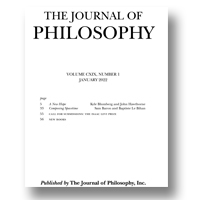|
1.
|
The Journal of Philosophy:
Volume >
120 >
Issue: 8
William M. R. Simpson
Small Worlds with Cosmic Powers
abstract |
view |
rights & permissions
| cited by
The wave function of quantum mechanics can be understood in terms of the dispositional role it plays in the dynamics of a distribution of matter in three-dimensional space (or four-dimensional spacetime). There is more than one way, however, of specifying its dispositional role. This paper considers Suárez’s theory of ‘Bohmian dispositionalism’, in which the particles are endowed with their own ‘Bohmian dispositions’, and Simpson’s theory of ‘Cosmic Hylomorphism’, in which the particle configuration comprises a hylomorphic substance which has an intrinsic power. I argue that Bohmian dispositionalism fails to capture intuitively correct counterfactuals about what would happen in Small Worlds which have only a small number of particles, but that this problem is avoided by Cosmic Hylomorphism, in which the cosmic power manifests a teleological process.
|
|
|
2.
|
The Journal of Philosophy:
Volume >
120 >
Issue: 8
Gwen Bradford
Uniqueness, Intrinsic Value, and Reasons
abstract |
view |
rights & permissions
| cited by
Uniqueness appears to enhance intrinsic value. A unique stamp sells for millions of dollars; Stradivarius violins are all the more precious because they are unlike any others. This observation has not gone overlooked in the value theory literature: uniqueness plays a starring role recalibrating the dominant Moorean understanding of the nature of intrinsic value. But the thesis that uniqueness enhances intrinsic value is in tension with another deeply plausible and widely held thesis, namely the thesis that there is a pro tanto reason to promote the good. It is argued that there is a second, distinct type of uniqueness that plays a more interesting and important axiological role: uniqueness imparts irreplaceable value. This gives occasion to develop the surprisingly undertheorized notion of irreplaceable value.
|
|
|
3.
|
The Journal of Philosophy:
Volume >
120 >
Issue: 8
Steven J. Brams, D. Marc Kilgour, Christian Klamler, Fan Wei
Two-Person Fair Division of Indivisible Items:
Bentham vs. Rawls on Envy
abstract |
view |
rights & permissions
| cited by
Suppose two players wish to divide a finite set of indivisible items, over which each distributes a specified number of points. Assuming the utility of a player’s bundle is the sum of the points it assigns to the items it contains, we analyze what divisions are fair. We show that if there is an envy-free (EF) allocation of the items, two other desirable properties—Pareto-optimality (PO) and Maximinality (MM)—can also be satisfied, rendering these three properties compatible. But there may be no EF division, in which case some division must satisfy a modification of Bentham’s (1789/2017) “greatest satisfaction of the greatest number” property, called maximum Nash welfare (MNW), that satisfies PO. However, an MNF division may be neither MM nor EFX, which is a weaker form of EF. We conjecture that there is always an EFX allocation that satisfies MM, ensuring that an allocation is maximin, precisely the property that Rawls (1971/1999) championed. We discuss four broader philosophical implications of our more technical analysis.
|
|
